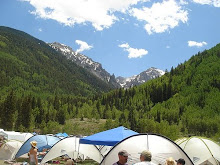Podcasts, Blogs, and Wikis used in the Classroom?
When you hear those terms, you would normally think that they are just for entertainment. I didn't think they would be useful (even after the reading) until I saw some examples for myself. Apparently, they are not only new, but they are already being actively used in classrooms all over. It did take me a while to find something that I wanted to post here, which I think suggests that there is no standard formula for creating them yet.
Podcasts:
http://talkinghistory.oah.org/
This website hosts an impressive archive of history podcasts on interesting subjects. Prominent historians discuss topics such as assasination plots, race and gender in sports, and truths behind historical myths. One episode discusses the origins of the myths surrounding George Washington while another does the same for Pocahontas. They also talk about controversial topics that students are interested in. One is called "Confederate Emancipation", which is about the Confederate army's plan to free and arm their slaves. I would recommend that a teacher play certain excerpts from such podcasts for class discussion. Since they bring up many different historical issues, it can certainly spur some discussion.
I was surprised to find many podcasts created by students. Student Podcasts @ the Warhol ( http://edu.warhol.org/podcasts/) is a group of high school students involved at the The Andy Warhol Museum. They talk about a wide range of topics and issues. Students can definatly improve their speaking skills by creating these podcasts. They can record them wherever they feel comfortable, and have a very large audience at the same time. That way, they can have more confidence talking about what they know instead of feeling nervous about talking in front of a group. Also, I think students will pay more attention to the issues being debated if it is created by and for their peers.
Blog:
I found a great example of a history class blog here: http://mrcsclassblog.blogspot.com/. The reason I like this is because it is created by the teacher, but it relies on student comments and input for its content. They can post pictures of their work and videos of them putting them together. This is a great way for students to take more pride in their work, because they have a much larger audience. Other students make comments, discuss their assignments, and see what others students think about their work. Students from all class periods come together to form a community outside of the classroom.
Wiki:
At first, I was unsure about how a class wiki can be helpful to students. Since information is so readily available on the internet, After seeing some examples of Wikispaces, it is much more clear. They are basically a way students and teachers can share important assignments, notes, and also host discussion forums about the class. http://bergmannscience.wikispaces.com is a good example of how it can be beneficial to the class. The teacher posts information about upcoming events, resources for their current units, videos and pictures. The benefits are similar to that of a blog, but everything is much more categorized (for .doc) and easy to find. I found a lot of different class wikis, but this seems to be among the best.
I hope to use these in my future classes, but I need to learn how to design these so that my students will want to use my website. These are potentially great assets to use in the coming years.
Subscribe to:
Post Comments (Atom)

It does seem like you need a degree in web design to make these kinds of things look professional. Its pretty surprising that wikis created by students can be so useful and have such a professional look. All these online tools really make me excited to be living in the age of the internet, where your school project can be someone elses information lifeline.
ReplyDelete